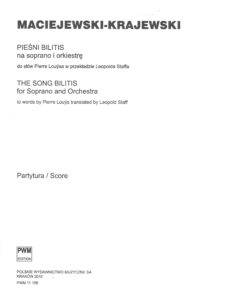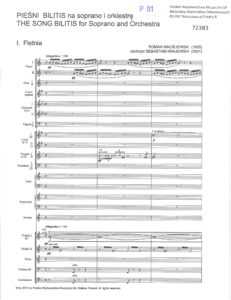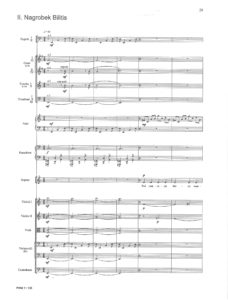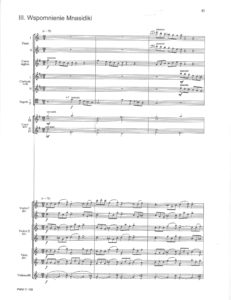The three Songs of Bilitis (no. 1: “The Panpipes”, no. 2: “The Tomb of Bilitis”, no. 3: “Memory of Mnasidika”) to words by Pierre Louÿs translated by Leopold Staff for soprano and piano were written most likely in 1932; their orchestral version originated in 1935. Unfortunately, the original version for piano got lost and the exact instrumental line-up in the orchestral version is unknown (we have a string quintet, flutes, clarinet, cor anglais, bassoons, trumpet, harp, horns, trombone, piano). What has survived to this day is only the text, the solo voice part, instrumentation of the first song and part of the third song. In 2001 Sebastian Krajewski completed the orchestral accompaniment of the third song (only two-thirds of the original has survived), orchestrated the whole of the second song and reconstructed the piano version of all three songs. This version was performed on 21 October 2001 at the Pawłowice Palace as part of the Roman Maciejewski Leszno Music Festival by Olga Pasichnyk (soprano) and Natalia Pasichnyk (piano).
In their character and subject matter the songs are a direct reference to French impressionism (see Debussy’s 3 Chansons de Bilitis) and are stylistically close also to the second period in Karol Szymanowski’s oeuvre. It should be noted that the subject matter of the poems used by the composer, i.e. Bilitis’ lesbian love for Mnasidiki, must have been seen in the inter-war period as a manifestation of Maciejewski’s openness (including openness to criticism). Despite such a risky choice, the songs were appreciated, not only by Szymanowski, who after hearing them performed by his sister Stanisława wrote to Helena Kahn-Casella that their author was a “young, very talented boy” (28 November 1932), but also by the critics from the Parisian Le Monde Musical (“they are lovely in their inspiration and well-made”, 31 March 1933).
- R. Maciejewski, The Songs of Bilitis for soprano and Orchestra, title page (PWM Edition)
- R. Maciejewski, The Songs of Bilitis for soprano and orchestra, The Panpipes, score excerpt (PWM Edition)
- R. Maciejewski, The Songs of Bilitis for soprano and orchestra, The Tomb of Bilitis, score excerpt (PWM Edition)
- R. Maciejewski, The Songs of Bilitis for soprano and orchestra, Memory of Mnasidika, score excerpt (PWM Edition)



